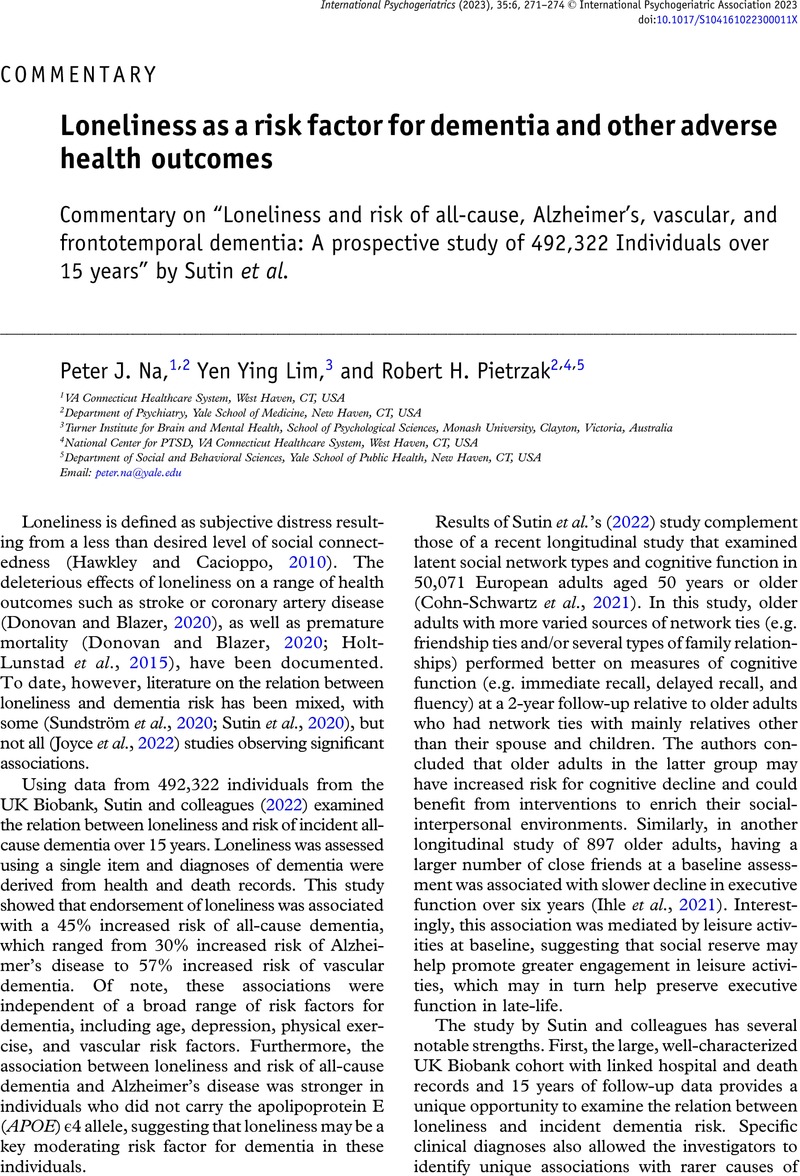No CrossRef data available.
Article contents
Loneliness as a risk factor for dementia and other adverse health outcomes
Commentary on “Loneliness and risk of all-cause, Alzheimer’s, vascular, and frontotemporal dementia: A prospective study of 492,322 Individuals over 15 years” by Sutin et al.
Published online by Cambridge University Press: 03 February 2023
Abstract
An abstract is not available for this content so a preview has been provided. Please use the Get access link above for information on how to access this content.

- Type
- Commentary
- Information
- International Psychogeriatrics , Volume 35 , Special Issue 6: Issue Theme: Loneliness in Older Adults , June 2023 , pp. 271 - 274
- Copyright
- © International Psychogeriatric Association 2023
References
Cohn-Schwartz, E., Levinsky, M. and Litwin, H. (2021). Social network type and subsequent cognitive health among older Europeans. International Psychogeriatrics, 33, 495–504.CrossRefGoogle ScholarPubMed
Donovan, N. J. and Blazer, D. (2020). Social isolation and loneliness in older adults: review and commentary of a national academies report. American Journal of Geriatric Psychiatry, 28, 1233–1244.CrossRefGoogle ScholarPubMed
Donovan, N. J. et al. (2016). Association of higher cortical amyloid burden with loneliness in cognitively normal older adults. JAMA Psychiatry, 73, 1230–1237.CrossRefGoogle ScholarPubMed
Hawkley, L. C. and Cacioppo, J. T. (2010). Loneliness matters: a theoretical and empirical review of consequences and mechanism. Annals of Behavioral Medicine, 40, 218–227.CrossRefGoogle Scholar
Holt-Lunstad, J., Smith, T. B., Baker, M., Harris, T. and Stephenson, D. (2015). Loneliness and social isolation as risk factors for mortality: a meta-analytic review. Perspectives on Psychological Science, 10, 227–237.CrossRefGoogle ScholarPubMed
Ihle, A. et al. (2021). The longitudinal relation between social reserve and smaller subsequent decline in executive functioning in old age is mediated via cognitive reserve. International Psychogeriatrics, 33, 461–467.CrossRefGoogle ScholarPubMed
Jeste, D. V. et al. (2023). Remotely administered resilience- and wisdom-focused intervention to reduce perceived stress and loneliness: pilot controlled clinical trial in older adults. American Journal of Geriatric Psychiatry, 31, 58–64.CrossRefGoogle ScholarPubMed
Joyce, J. et al. (2022). Social isolation, social support, and loneliness and their relationship with cognitive health and dementia. International Journal of Geriatric Psychiatry, 37, Online ahead of print.CrossRefGoogle Scholar
Kahlon, M. K. et al. (2021). Effect of layperson-delivered, empathy-focused program of telephone calls on loneliness, depression, and anxiety among adults during the COVID-19 pandemic: a randomized clinical trial. JAMA Psychiatry, 78, 616–622.CrossRefGoogle ScholarPubMed
Kessler, R. C., Little, R. J. and Groves, R. (1995). Advances in strategies for minimizing and adjusting for survey non-response. Epidemiologic Reviews, 17, 192–204.CrossRefGoogle Scholar
Na, P. J., Jeste, D. V. and Pietrzak, R. H. (2022). Social disconnection as a global behavioral epidemic- a call to action about a major health risk factor. JAMA Psychiatry, 80, 101–102.CrossRefGoogle Scholar
Roland, M., Everington, S. and Marshall, M. (2020). Social prescribing— transforming the relationship between physicians and their patients. New England Journal of Medicine, 383, 97–99.CrossRefGoogle ScholarPubMed
Russell, D., Peplau, L. A. and Cutrona, C. E. (1980). The revised UCLA loneliness scale: concurrent and discriminant validity evidence. Journal of Personality and Social Psychology, 39, 472–480.CrossRefGoogle ScholarPubMed
Sundström, A., Adolfsson, A. N., Nordin, M. and Adolfsson, R. (2020). Loneliness increases the risk of all-cause dementia and Alzheimer’s disease. Journals of Gerontology. Series B, Psychological Sciences and Social Sciences, 75, 919–926.CrossRefGoogle ScholarPubMed
Sutin, A. R., Luchetti, M., Aschwanden, D., Zhu, X., Stephan, Y. and Terracciano, A. (2022). Loneliness and risk of all-cause, Alzheimer’s, vascular, and frontotemporal dementia: a prospective study of 492,322 individuals over 15 years. International Psychogeriatrics, 35, 283–292.Google Scholar
Sutin, A. R., Stephan, Y., Luchetti, M. and Terracciano, A. (2020). Loneliness and risk of dementia. Journals of Gerontology. Series B, 75, 1414–1422.CrossRefGoogle ScholarPubMed
Taylor, P. (2021). Compassionate Contact Corps provides social support for veterans. VA News. https://news.va.gov/88231/compassionate-contact-corps-provides-social-support-veterans/
Google Scholar
Uquillas, F. O. et al. (2018). Regional tau pathology and loneliness in cognitively normal older adults. Translational Psychiatry, 8, 282.CrossRefGoogle Scholar
Wang, J., Mann, F., Lloyd-Evans, B., Ma, R. and Johnson, S. (2018). Associations between loneliness and perceived social support and outcomes of mental health problems: a systematic review. BMC Psychiatry, 18, 156.CrossRefGoogle ScholarPubMed
Wildman, J. and Wildman, J. M. (2022). Impact of a link worker social prescribing intervention on non-elective admitted patient care costs: a quasi-experimental study. Social Science & Medicine, 317, 115598.Google ScholarPubMed




